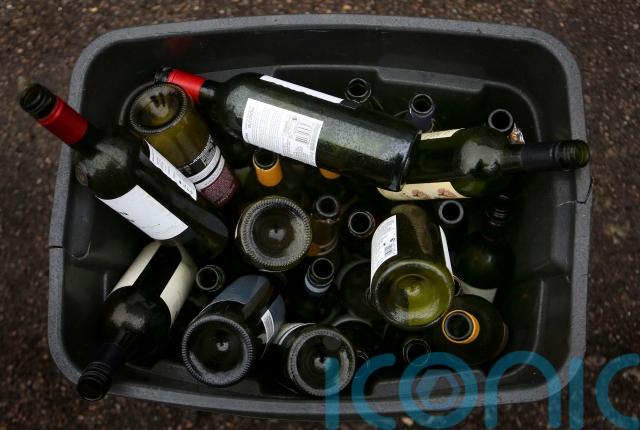
The minister in charge of Scotland’s deposit return scheme (DRS) has refused to say if the government was informed of changes to fee payments that critics claimed were introduced in an “underhand and sleekit fashion”.
Circular economy minister Lorna Slater came under pressure at Holyrood as she conceded it would take “longer” for retailers who install reverse vending machines to accept empty bottles and cans to get their payments.
Ms Slater insisted the fees payable to shops taking part in DRS were a matter for Circularity Scotland – the private, not for profit company set up to administer the scheme – and not the Scottish Government.
But she was challenged by Labour, the Tories and a former SNP cabinet secretary over whether ministers had been told of the changes.

Fergus Ewing, who served as rural economy secretary in the Scottish Government, has become an outspoken critic of the initiative – which is due to come into force in August.
The scheme will see shoppers pay a 20p deposit when buying a drink in a can or bottle, with this cash returned to consumers when they bring the empty container back for recycling.
But Mr Ewing said businesses who have installed reverse vending machines to handle these returns had been “misled, duped and deceived by Circularity Scotland” as they will have to wait a month to receive their fees “rather than the previously expected seven days”.
The SNP MSP hit out, and said: “For the past 18 months Circularity Scotland have in all their documents, on their website and in presentations confirmed that payments to retailers using reverse vending machines would be made in seven days.
“Now that seven-day period has been extended to one month, a decision taken by Circularity Scotland with zero consultation with convenience stores, nor any explanation, nor any press release.”
He asked Ms Slater if she agreed that “this decision by Circularity Scotland was taken in both an underhand and a sleekit fashion”.

Mr Ewing also asked the circular economy minister if she had been consulted on the change – with both the Conservatives and Labour pressing her on this.
Tory MSP Maurice Golden pressed Ms Slater, asking: “Was she consulted on retail handling fee changes, yes or no?”
Labour’s Colin Smyth also challenged her, saying: “Just for clarification, can the minister say whether or not she was consulted on the changes in these handling fees, yes or no?”
Ms Slater did not say if the government had been informed of the changes by Circularity Scotland.
Instead, she told MSPs: “The retailer handling fee, which is the payment given to retailers to cover the costs of being a return point for Scotland’s deposit return scheme, is the highest fee compared to other deposit return schemes around the world.”
She said that while the payment terms for businesses that receive containers back manually set out that the fees would be paid in seven days, “the payment terms for larger locations that install automatic return points will be longer”.
The minister added that “any business with concerns should contact Circularity Scotland for advice and support”.
She continued: “Circularity Scotland is a private, non-profit company and it is responsible for operating the scheme, including setting retailer handling fees.
“The Scottish Government is not involved in setting retailer handling fees.”
Pressed on the issue further, she added: “As set out in the DRS regulations, the Scottish Government is not involved in setting retailer handling fees.”
Ms Slater went on to state: “I repeat again, Circularity Scotland is a private, non-profit company and they are responsible for operating the scheme, including setting retail handling fees.
“The Scottish Government is not involved in setting retailer handling fees.”
Circularity Scotland said it was “committed to ensuring the most efficient and easiest possible system for payment of fees, particularly for smaller businesses”.
A spokesperson said: “Scotland’s Deposit Return Scheme will have the highest return handling fees of any scheme in the world, ensuring that DRS will provide a commercial return for many businesses acting as return points.
“We’ve sought to make the payments system scalable depending on the size of the return point, taking into account the size of the premises and expected volume.
“The payment terms for all manual return point operators, who will make up the significant majority of return points, as well as for all hospitality venues, will be seven days.
“Slightly longer terms are now in place for larger locations with automatic return points.
“This was confirmed at the point that registration for acting as a return point was opened, more than six months ahead of the scheme going live.”
The spokesperson added: “As the scheme beds in we will continue to review costs and payment terms to ensure we operate as leanly as possible and minimise the impact of DRS on our stakeholders.
“Any retailer concerned about any aspect of the scheme should get in touch with Circularity Scotland so we can discuss their particular circumstances and support them.”
Subscribe or register today to discover more from DonegalLive.ie
Buy the e-paper of the Donegal Democrat, Donegal People's Press, Donegal Post and Inish Times here for instant access to Donegal's premier news titles.
Keep up with the latest news from Donegal with our daily newsletter featuring the most important stories of the day delivered to your inbox every evening at 5pm.